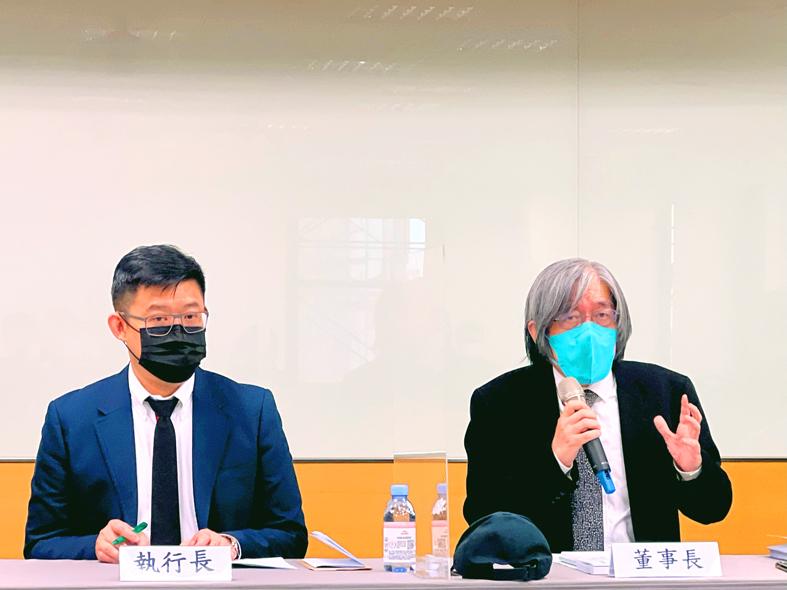PChome Online Inc’s (網路家庭) consolidated revenue reached NT$3.86 billion (US$129.6 million) last month, down 1.2 percent from the previous month and 9.93 percent from a year earlier, the e-commerce company said in a regulatory filing yesterday.
The figure reflects the firm’s sales performance across all of its business units, including business-to-consumer e-commerce, online marketplace and fintech, it said, without providing a detailed revenue breakdown for last month.
Taiwan’s eased COVID-19 restrictions have resulted in increased sports and outdoor activities, which boosted online sales of picnic and camping items, sports shoes and apparel, the company said.

Photo: CNA
Rising health awareness during the COVID-19 pandemic also propped up online sales of health food items, it added.
Ahead of the summer break last month, sales of board games and gaming devices, as well as Apple Inc products, posted double-digit percentage growth from a month earlier, the firm said.
Sales of electric fans and air-conditioners also rose significantly, as people want to keep cool during summer, PChome said.
Second-quarter revenue was NT$11.18 billion, down 4.52 percent quarter-on-quarter and 4.71 percent year-on-year, company data showed.
Revenue in the first six months of this year totaled NT$22.89 billion, a 1.44 percent drop from the same period last year, the company said. That compares with a 0.49 percent annual increase in sales in the first five months.
The slump in revenue came as PChome CEO Kevin Tsai (蔡凱文) on Monday last week resigned his post and his seat on the company’s board effective immediately, citing career plans, the company said in a regulatory filing at the time.
Chairman Jan Hung-tze (詹宏志) is to serve as acting CEO before the company’s board of directors appoints a new CEO, the filing said.
Tsai's resignation was not without cause. While PChome posted revenue of NT$48.58 billion last year, up 10.7 percent from 2020, its net profit plunged 61.5 percent year-on-year to NT$97.44 million, with earnings per share dropping from NT$2.16 to NT$0.84.
Analysts linked the poor performance to PChome being slow to respond to intensifying competition in the local e-commerce market and a changing business environment.
The company’s dire situation continued in the first quarter of this year, when it reported net losses of NT$32 million, or losses per share of NT$0.25, prompting an outcry from shareholders on June 22. Jan at the time pledged to cut his salary to zero and halve the CEO’s pay if the company’s bottom line did not improve by the end of this year.
While e-commerce remains the company’s core business, accounting for about 99 percent of its total sales, PChome has in recent years branched into other businesses to diversify its revenue sources, such as mobile payment, “buy now, pay later” and third-party electronic payment services.

MULTIFACETED: A task force has analyzed possible scenarios and created responses to assist domestic industries in dealing with US tariffs, the economics minister said The Executive Yuan is tomorrow to announce countermeasures to US President Donald Trump’s planned reciprocal tariffs, although the details of the plan would not be made public until Monday next week, Minister of Economic Affairs J.W. Kuo (郭智輝) said yesterday. The Cabinet established an economic and trade task force in November last year to deal with US trade and tariff related issues, Kuo told reporters outside the legislature in Taipei. The task force has been analyzing and evaluating all kinds of scenarios to identify suitable responses and determine how best to assist domestic industries in managing the effects of Trump’s tariffs, he

TIGHT-LIPPED: UMC said it had no merger plans at the moment, after Nikkei Asia reported that the firm and GlobalFoundries were considering restarting merger talks United Microelectronics Corp (UMC, 聯電), the world’s No. 4 contract chipmaker, yesterday launched a new US$5 billion 12-inch chip factory in Singapore as part of its latest effort to diversify its manufacturing footprint amid growing geopolitical risks. The new factory, adjacent to UMC’s existing Singapore fab in the Pasir Res Wafer Fab Park, is scheduled to enter volume production next year, utilizing mature 22-nanometer and 28-nanometer process technologies, UMC said in a statement. The company plans to invest US$5 billion during the first phase of the new fab, which would have an installed capacity of 30,000 12-inch wafers per month, it said. The

Taiwan’s official purchasing managers’ index (PMI) last month rose 0.2 percentage points to 54.2, in a second consecutive month of expansion, thanks to front-loading demand intended to avoid potential US tariff hikes, the Chung-Hua Institution for Economic Research (CIER, 中華經濟研究院) said yesterday. While short-term demand appeared robust, uncertainties rose due to US President Donald Trump’s unpredictable trade policy, CIER president Lien Hsien-ming (連賢明) told a news conference in Taipei. Taiwan’s economy this year would be characterized by high-level fluctuations and the volatility would be wilder than most expect, Lien said Demand for electronics, particularly semiconductors, continues to benefit from US technology giants’ effort

‘SWASTICAR’: Tesla CEO Elon Musk’s close association with Donald Trump has prompted opponents to brand him a ‘Nazi’ and resulted in a dramatic drop in sales Demonstrators descended on Tesla Inc dealerships across the US, and in Europe and Canada on Saturday to protest company chief Elon Musk, who has amassed extraordinary power as a top adviser to US President Donald Trump. Waving signs with messages such as “Musk is stealing our money” and “Reclaim our country,” the protests largely took place peacefully following fiery episodes of vandalism on Tesla vehicles, dealerships and other facilities in recent weeks that US officials have denounced as terrorism. Hundreds rallied on Saturday outside the Tesla dealership in Manhattan. Some blasted Musk, the world’s richest man, while others demanded the shuttering of his